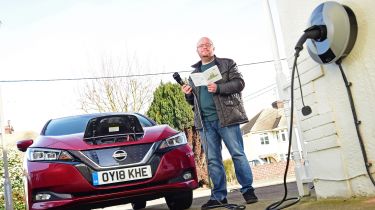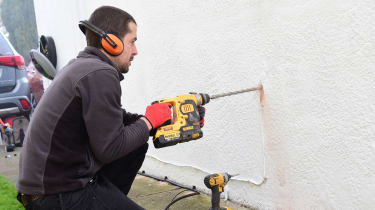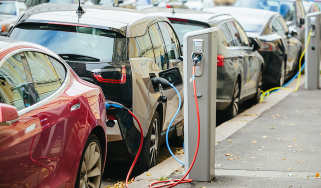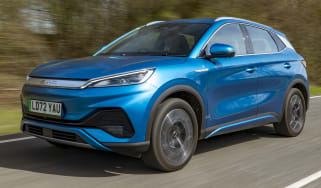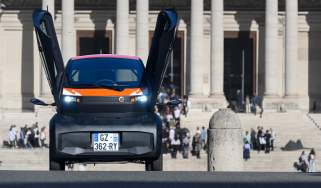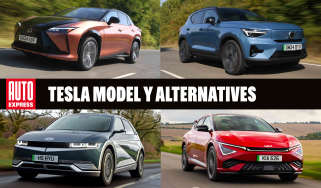Home electric car chargers: how to choose a wallbox and have it installed
If you’ve got an electric car and somewhere to park it at home, a wallbox charger is a great idea
For most people, charging an electric car at home is the most convenient way to top up an electric car’s battery. However, relying on the slowest home-based solution and plugging into a domestic socket isn’t always practical.
That’s where a dedicated home wallbox charger comes in, offering faster charging speeds and a dedicated EV charging power outlet either outside or in a garage. On-street solutions are also available in some cases.
Most wallboxes will supply alternating current (AC) at a maximum of 7.4kW; a normal three-pin plug is limited to 3kW, although car manufacturers don’t recommend using these long-term, because this can cause damage to the socket due to the high amperage drawn over a sustained period of time.
Faster (up to 22kW) three-phase set-ups are available if your home circuit will allow, but the idea of rapid direct current (DC) charging is almost exclusively reserved for public charging stations – for the time being, at least – where speeds of 50 or 100kW are common, and figures of up to 350kW are possible.
How do I choose a home electric car charger?
All home chargers come with either a Type 1 or Type 2 cable. It’s more likely to be the latter, because these are accepted by all PHEVs and EVs sold in the UK.
Once you’ve checked the cabling will fit, it’s time to look at how fast you’d like your car to charge. Think about how you intend to use the charger, cross-referencing with the size of the battery fitted to your car. A plug-in hybrid will charge fully overnight on a 7kW charger, while some larger-battery EVs may need longer.
The higher the power, the more the unit will cost. Wallbox providers will also arrange installation, and this process is sometimes included in the price, but not always.
A series of safety checks will need to be passed before your installation gets the go-ahead, including an assessment of your mains power supply, but once complete a certified technician can usually get your wallbox set up in a few hours. From here, you’ll be able to charge your car quickly and easily at home.
How does the home wallbox charger installation work?
- Handover - Your wallbox supplier will arrange for your unit to be delivered
- Fitting - The installer will drill through the outside wall to allow the wallbox to be connected to the electric supply
- Connected - Your new wallbox is wired into the household mains via the consumer unit
- Features - Most wallboxes have WiFi connections to let you monitor usage; Units made after 1 January 2019 have a ‘fuse saver’ to prevent circuits from tripping
- In control - Connecting your wallbox to the internet will let you monitor how much electricity you’re using and how much it is costing you to charge your car
What home charger grants and tax breaks are available?
Some government grants are available to those installing a charger at home. A previous scheme offering grants to house owners was replaced in 2022 by a new grant for renters and flat owners.
This grant offers 75 per cent off the cost of buying and installing a charger, up to a maximum of £350. To be eligible your car must be on a pre-approved list of vehicles, and your home must be either a flat – owned or rented – or a multiple occupancy property where your tenancy is defined by a rental agreement. Crucially, the property must have ‘designated, off-street parking’.
A grant is also available for those who own or rent a property with on-street parking. It offers the same 75 per cent off installation up to a maximum of 75 per cent, but ultimately depends on permissions from your local authorities to install a ‘cross-pavement charging solution between your home and the approved parking space’.
The list of requirements for each of these grants is much more detailed than we can cover here but it’s all laid on the government website.
There are no tax breaks for private owners but electric company car users can claim back expenses when charging for business miles at home.
Find out about the best public charge point providers in the uk here...
Your electric car questions answered
- Should i buy an electric car?
- What’s the best way to buy an electric car?
- Is a hybrid, plug-in hybrid or electric car right for me?
- Should i buy a used electric car?
- Can i get a plug-in car grant?
- How is electric car range calculated?
- How much do electric cars cost to charge?
- How much do electric cars cost to run?
- How long do electric car batteries last?
- What happens to old electric car batteries?
- Should i get a heat pump on my electric car?
- What are fast charging and rapid charging?
- Should i get a home electric car charger?
- Can i tow with an electric car?
- Is wireless electric car charging the future?
- What’s the history of the electric car?
- What’s the future of the electric car?
Find a car with the experts

